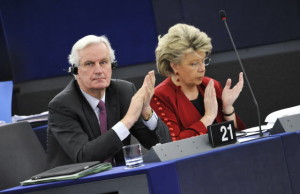The European Parliament calls for more stringent penalties in order to avoid new cases such as the Libor and Euribor scandals. Rapporteur McCarthy: “A big step forward in enabling courts across the EU to halt market abuses.”
Insider dealing and market manipulation are serious offences and should be imposed at least four years in jail. That is what the European Parliament called for in a draft rule introducing EU-wide criminal penalties for this kind of abuses. “Today’s vote is a big step forward in enabling courts across the EU to halt market abuse,” said Arlene McCarthy (S&D). “This is the first law to introduce tough EU-wide criminal penalties for market abuse, with a minimum jail sentence of 4 years for serious offences such as insider dealing and market manipulation,” said the Rapporteur of the text, which passed by 618 votes to 20, with 43 abstentions.
““Criminals who get rich by manipulating markets and insider dealing should not get away with just an administrative penalty,” added Emine Bozkut (S&D), the other Rapporteur of the text.
“Today’s vote send a clear message: zero tolerance for financial market abusers,” said Viviane Reding, EU Commissioner for Justice, and Michel Barnier, EU Commissioner for Internal Market.
The new rules lay down tougher criminal penalties for serious market abuses such as unlawful disclosure of information (insider trading), insider dealing or market manipulation and also inciting, aiding or abetting them.
Judges will be required to sentence maximum penalty offenders to no less than four years in jail for the most serious forms of insider dealing or market manipulation and no less than two years for unlawful disclosure of information
Market manipulation offences punishable by a four-year jail term would include entering into a transaction or placing an order which gives false or misleading signals about the supply, demand or price of one or more financial instruments or providing false or misleading inputs to manipulate the calculation of benchmarks, such as the London Interbank Offered Rate (LIBOR) or Euro Interbank Offered Rate (EURIBOR).
Insider dealing offences punishable by four years’ imprisonment include those in which inside information is used with intent to buy or sell financial instruments or to cancel or amend an order.
The EURIBOR is a reference rate based on the averaged interest rates at which Eurozone banks offer funds to other banks, as the LIBOR

is the average interest rate estimated by lending banks in London. They are based on average interest rates established by a panel of around 50 European banks that lend and borrow from each other. In the past several investigations showed significant fraud and collusion by member banks, connected to rate submissions. According to Wolf Klinz (ALDE), this scandal “has shown how different Member States’ legislations have been a fertile soil for this plague to prosper.”
Once the draft rules are formally approved by the Council of Ministers, member states will have 24 months to put them into effect.


![Una donna controlla le informazioni sul cibo specificate sulla confezione [foto: archivio]](https://www.eunews.it/wp-content/uploads/2014/12/Etichette-alimentari.jpg)


![Ragazza in biblioteca. Nell'Ue chi studia non lavora e neppure cerca. In Italia funziona ancor più così [foto: Tulane University, Wikimedia Commons]](https://www.eunews.it/wp-content/uploads/2024/11/Girl_in_the_Library_3638661587-350x250.jpg)



